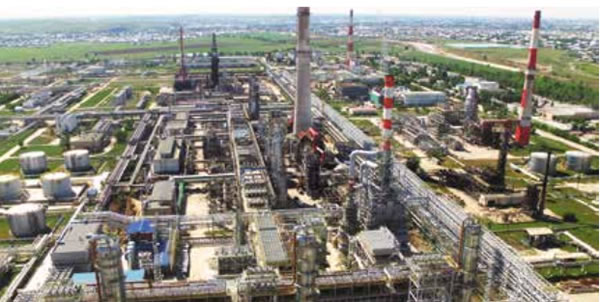Results of the Year
PetroKazakhstan Oil Products: Life After Modernisation
After this autumn’s completion of the upgrade process, PetroKazakhstan Oil Products’ Shymkent Oil Refinery was able to increase refining depth, output and petroleum product quality, and improved the environmental attributes of its production and economic performance.
In September 2018, PKOP reported the completion of modernisation and reconstruction work at the refinery. Bolat Bayetov, Shymkent Refinery Technical Director, defines the Modernisation project’s three goals as:
- increasing refining depth
- ensuring product quality reaches international Euro-4 and Euro-5 ecological standards
- increasing oil refining capacity to 6 million tonnes per year
«We have achieved these goals,» Bolat Bayetov says. «Whereas prior to upgrade, refining depth was 73%, it’s now 81%. Before modernisation, light petroleum product output averaged 56%, we’re now at 80%. As for the environment; before modernisation we followed Kazakhstan and Customs Union GOST standards, but now we’ve advanced to international Euro-4 and Euro-5 standards, which under Customs Union technical guidelines, are denoted as «K-4» and «K-5». In other words, we’ve achieved all of the objectives we set ourselves before launching the modernisation and reconstruction process».
Refinery modernisation and reconstruction was divided into two stages, with the goal of the first stage being to raise product quality to international Euro-4 and Euro-5 ecological standards. What made it possible? Firstly, an elementary sulphur production unit was built. Secondly, a light naphtha isomerisation unit installed; and thirdly, the diesel hydro-dewaxing unit was reconstructed, all of which have helped to reduce diesel sulphur content.
It is commonly known, the main objective, from a K-4 ecological standard perspective, is to reduce sulphur content in diesel to no more than 50 ppm (in percentage terms, the ppm is in thousandths). Before this, the refinery operated according to GOST standards, which permitted sulphur content of up to 500 ppm. Today, after upgrade, diesel ppm does not exceed 10. Currently, the refinery works with crude suppliers on processing terms to produce K-4 diesel. Technical capabilities allow the refinery to produce higher class K-5 diesel, if needs to be. The refinery also produces K-4 gasoline and has the technical capability to produce higher quality gasoline, if crude suppliers for processing require it.
The refinery has the capacity to produce TS aviation fuel, and is currently in the process of having it certified according to European Jet A-1 standard. This is a slow process as it requires adapting a number of normative documents and bureaucratic procedures. However, the result should be that any airline flying to Kazakhstan will be able to buy Kazakhstan fuel. The Kazakhstan Minister of Energy, Kanat Bozymbayev, recently stated that because all three oil refineries in Kazakhstan had begun to produce aviation fuel with the completion of the modernisation project, all domestic demand would be met starting from next year.
«In general, for gasoline and diesel fuel, we have moved away from import dependence,» says Bolat Baetov.
As you know, this October, the Kazakhstan Minister of Energy, Kanat Bozumbayev and his Russian colleague, Alexander Novak, signed a document amending a Government Treaty from 9 December 2010 on Trade and Economic Cooperation in Oil and Petroleum Supplies to Kazakhstan. The document allows Kazakhstan to begin exports to neighbouring countries. Specifically, the Kazakhstan Ministry of Energy has already announced its intention to export Kazakhstan light petroleum products to Kyrgyzstan, Uzbekistan and Tajikistan. The corresponding talks are currently being held.
The Shymkent Oil Refinery modernisation has had yet another important economic effect, reducing major repair downtime. As you know, the Ministry of Energy and KazMunaiGas have adopted new technical regulations, increasing the post-modernisation and reconstruction period between repairs at all three oil refineries to three years. «According to the regulatory document of the Ministry of Energy, now each of the three refineries will stop for a major overhaul every three years, while the other two will operate at full capacity. This will allow, in addition to cost reduction, to avoid a shortage of petroleum products,» says Bayetov.
The company has approved its main production plans for 2019, which involve refining 6 million tonnes of crude oil and producing 2,244 million tonnes of vehicle fuel; 1,565 million tonnes of diesel; and 315 thousand tonnes of aviation fuel.
«Next year we plan to process 6 million tons of crude oil, taking into account the two-week day-today shutdown, not overhaul,» said Bolat Baetov, technical director of the refinery. – We have developed a 5-year work program for 20192023. And it contains 6 million tons of processed oil annually. According to our calculations, if plant refinery does not stop in a certain year, then there is a technical possibility to process 6 million tons per year.»




